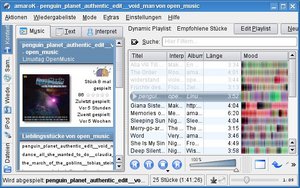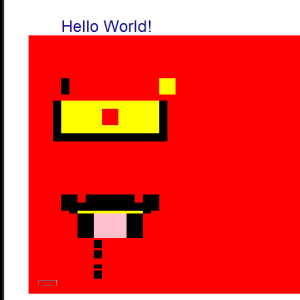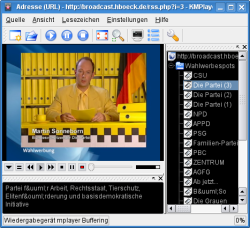Monday, February 13. 2006
amaroK 1.4 with moodbar
 The greatest music player of all time, called amaroK, just had the first beta release of the upcoming version 1.4.
The greatest music player of all time, called amaroK, just had the first beta release of the upcoming version 1.4.The most visible new feature is the so-called moodbar that tries to color the »mood« of a track. Okay, it does a hell of cpu-usage and I doubt it's very useful, but it looks really funky.
Gentooers: emerge sync, add media-sound/amarok to your package.unmask, add use-flag exscalibar, enjoy!
Posted by Hanno Böck
in Computer culture, English, Gentoo, Linux, Music
at
20:51
| Comments (13)
| Trackbacks (0)
Thursday, February 9. 2006
Xgl and compiz overlay update
 This blog got lot's of visits recently, probably because of the interest in my xgl overlay.
This blog got lot's of visits recently, probably because of the interest in my xgl overlay.I've now created a new one based on the latest code changes in mesa and xgl, together with the new opengl window- and compositemanager compiz.
I'm releasing it although it's not really working for me at the moment.
I can run Xgl with compiz on my Radeon 9200 card with the free xorg driver, but have redraw-problems, so I don't know if the effects work at the moment. If you made better experiences, please post them here (I'm especially interested if it works better with other cards, e. g. nvidia ones).
Short Howto:
- Download latest xgl-overlay-xxxx.tar.bz2, unpack it, point PORTDIR_OVERLAY to it
- emerge mesa glitz xgl compiz
- Run Xgl :1 -ac -accel glx:pbuffer -accel xv:pbuffer (ati) or Xgl :1 -ac -accel glx:pbuffer -accel xv (nvidia)
- Run DISPLAY=:1 compiz decoration, DISPLAY=:1 gnome-window-decorator and DISPLAY=:1 xterm (or something else)
If you just wanna see how it looks, here is the Novell announcement with some videos.
Friday, February 3. 2006
Internet Explorer 7 and CSS - at least a bit better

Acid2 in IE7
As I've been interested in webdesign for quite a long time, I was often worried that you couldn't use a bunch of possibilities in modern HTML code, because the nearly monopoly browser doesn't support them. Microsoft has not done any development on the IE for several years. When Firefox started to endanger the market share of the IE, they decided to change their mind.
Now I had the chance to have a first look at the IE7 on a friends laptop. I won't comment on the interface improvements, cause I wouldn't seriously suggest anyone to use this browser. I'm only interested from a webdesigners perspective, because I know that despite of all the buzz about Firefox, still a lot of people use the »default« on their system without thinking about it and probably will continue to do so.
I held a bunch of html/css test-cases for a while with examples I faced due to my webdesign work and found out that they don't work in some browsers.
A quick note: IE7 will behave completely as crappy as before if your docs have a HTML 4 doctype declaration. So to check the new css features, define XHTML 1.1 in your doctype and IE7 will use a »strict-mode« to render your pages.
The features I was missing most in the past are finally implemented: Transparent PNGs, fixed-positioned objects and defining objects through their left and right distance.
Beside that, there are still a bunch of features missing, min-height, max-height, empty-cells, just to name some. In my test-cases, it couldn't compete with any other browser, although they may be not representative. If you have suggestions for enhancements to the test-cases, feel free to mail me or post them.
My blog looks quite okay, some minor bug with the top black line, maybe I'll investigate this further (well, maybe not, maybe you just shouldn't use IE to watch this page ;-) ). Acid2 looks crappy as before.
So as a conclusion, IE7 has fixed the most grave issues, but is far away from fully implementing CSS2. If the free browsers want to enlarge their ledge over IE, I'm still waiting for the first browser to call CSS2-complete.
I hope this can be a chance to come a step forward in webdesign. For the future, the CSS3 previews looks very promising, I hope it won't take as many years as CSS2 till browser developers will take care about it.
Friday, January 27. 2006
Web 0.1 - Channel 4, IT Crowd
Channel 4, a UK television channel, has a new series called IT Crowd. As they are very modern and as the series is about an IT company, they may have thought:
»We've heard of this bleeding-edge thing called internet. Maybe we should do something about that.«
And here is what they did: They provided an obscure mix of javascript and flash to play an embedded wmv-file (which doesn't work in my konqueror, although I have the appropriate plugins installed). Julian wrote about it and was able to extract the download URL. WMV9, so no chance without win32codecs atm.
More and more tv stations provide some stuff online and this is really fine. It could be more, it could be better quality, there should be more free licensed stuff etc., but still, it's a step in the right direction. But hey, providing proprietary file formats embedded in proprietary is not how the web should look like in 2006. RSS-Feeds are made for stuff like that. Why can't they just use them? We have a bunch of formats that can at least be played on nearly every platform (and, not to forget that I'd always prefer an mpeg/patent-free format like ogg theora).
Sidenote: Recently I wrote to the german tv magazine Monitor, that provides it's files as real-streams, why they couldn't provide RSS with other formats. Their answer was that it's due to copyright reasons so people cannot download the files ...
... with their Internet Explorer. If you come over an rtsp/mms/whatever-stream and want to download it, mplayer is your friend. mplayer -dumpstream [url] fetched every stream I ever wanted to download.
»We've heard of this bleeding-edge thing called internet. Maybe we should do something about that.«
And here is what they did: They provided an obscure mix of javascript and flash to play an embedded wmv-file (which doesn't work in my konqueror, although I have the appropriate plugins installed). Julian wrote about it and was able to extract the download URL. WMV9, so no chance without win32codecs atm.
More and more tv stations provide some stuff online and this is really fine. It could be more, it could be better quality, there should be more free licensed stuff etc., but still, it's a step in the right direction. But hey, providing proprietary file formats embedded in proprietary is not how the web should look like in 2006. RSS-Feeds are made for stuff like that. Why can't they just use them? We have a bunch of formats that can at least be played on nearly every platform (and, not to forget that I'd always prefer an mpeg/patent-free format like ogg theora).
Sidenote: Recently I wrote to the german tv magazine Monitor, that provides it's files as real-streams, why they couldn't provide RSS with other formats. Their answer was that it's due to copyright reasons so people cannot download the files ...
... with their Internet Explorer. If you come over an rtsp/mms/whatever-stream and want to download it, mplayer is your friend. mplayer -dumpstream [url] fetched every stream I ever wanted to download.
Posted by Hanno Böck
in Copyright, English, Linux, Movies, Webdesign
at
22:45
| Comments (2)
| Trackbacks (0)
Wednesday, January 18. 2006
Firefox implementing spy-feature
As reported on several news-pages, Firefox is going to implement a »ping« that implements a new »feature« to the link-tag to send a ping out to some URL defined. This has a very bad taste to me.
What I always liked in the free software world was that not every app is sending »something« to »someone« in the net, as it's quite common in Windows apps. I remember on the last days I were using Windows (98) on a regular basis, I had some of those »personal firewalls« installed. Apps that had absolutely nothing to do with the net wanted to connect to their home-server, apps where I've selected »no internet connection« still tried to do »something« online (the last one for example was winamp).
Now, I know that the design of the world wide web is really privacy-unfriendly. Yes, you can filter out a lot of things with stuff like privoxy, but in the end, you have the only possibility to disable everything (javascript, image loading from foreign servers, cookies) and lose the possibility to use a bunch of web-services. The browser can't do much about this, as this is how the web is designed.
But still, I think this firefox »feature« is a big mistake. Especially free software applications should be much more precautious about their users privacy. I can't see a big use of it for the user. But I can think of a bunch of possibilities to misuse it.
We are always crying about the »evil ones«, the spyware-producers out there, just remember the recent buzz about the iTunes-spyware-functionality. That's perfectly right. But in the end, we need to do better in free software to provide an alternative. I hope that the firefox developers re-think about this and remove or at least disable-by-default these website-pings before their next release.
What I always liked in the free software world was that not every app is sending »something« to »someone« in the net, as it's quite common in Windows apps. I remember on the last days I were using Windows (98) on a regular basis, I had some of those »personal firewalls« installed. Apps that had absolutely nothing to do with the net wanted to connect to their home-server, apps where I've selected »no internet connection« still tried to do »something« online (the last one for example was winamp).
Now, I know that the design of the world wide web is really privacy-unfriendly. Yes, you can filter out a lot of things with stuff like privoxy, but in the end, you have the only possibility to disable everything (javascript, image loading from foreign servers, cookies) and lose the possibility to use a bunch of web-services. The browser can't do much about this, as this is how the web is designed.
But still, I think this firefox »feature« is a big mistake. Especially free software applications should be much more precautious about their users privacy. I can't see a big use of it for the user. But I can think of a bunch of possibilities to misuse it.
We are always crying about the »evil ones«, the spyware-producers out there, just remember the recent buzz about the iTunes-spyware-functionality. That's perfectly right. But in the end, we need to do better in free software to provide an alternative. I hope that the firefox developers re-think about this and remove or at least disable-by-default these website-pings before their next release.
Friday, January 13. 2006
Howto install xgl with glxcompmgr and fancy effects
Warning: By following the instructions below, you are probalby replacing some base libs from your system (mesa, glitz). This can and will seriously break your whole system if you don't know what you're doing. You may likely face other problems than I, so be prepared to play around yourself if you try this.
Ok, now for the fun part. Xgl is some experimental code for the next generation of X systems, with rendering completely done in OpenGL. Recently, David Reveman presented some major updates of the xgl-code. The instructions should be generic so you can do this on any distribution, however if you're using Gentoo, it'll be much easier, because you can get my xgl-overlay containing ebuilds for everything you need (get xgl-overlay-xxxx.tar.bz2 from here, I'll put up updated versions if neccessary). Non-Gentooers should also fetch this tarball, cause it contains all patches you'll need to follow the instructions.
I did this with an ATI Radeon 9200, till now this only works with the proprietary drivers from ATI or Nvidia. I haven't tried this with Nvidia, but it should work mostly the same way.
Problems so far:
Update:
I just found a problem some people had according to a portage bug. I've put a fixed portage-ebuild into the overlay (this may lead to problems if portage-devs decide to release an update called 2.1_pre3-r2).
Ok, now for the fun part. Xgl is some experimental code for the next generation of X systems, with rendering completely done in OpenGL. Recently, David Reveman presented some major updates of the xgl-code. The instructions should be generic so you can do this on any distribution, however if you're using Gentoo, it'll be much easier, because you can get my xgl-overlay containing ebuilds for everything you need (get xgl-overlay-xxxx.tar.bz2 from here, I'll put up updated versions if neccessary). Non-Gentooers should also fetch this tarball, cause it contains all patches you'll need to follow the instructions.
I did this with an ATI Radeon 9200, till now this only works with the proprietary drivers from ATI or Nvidia. I haven't tried this with Nvidia, but it should work mostly the same way.
- First you need a system based on the modular X version, that means Xorg 7.0. Gentoo users read this, others don't ask me, ask your distribution.
- Now configure your X to use the fglrx-driver (ATI owners) or the nvidia-driver with Direct Rendering activated (check with glxinfo). I'm not going into detail, there are enough instructions for that out there.
- Get a cvs-version of glitz and replace your local glitz-installation with it (Gentooers: use ebuild from overlay). I didn't face any problems with my normal system by doing this, but this may differ.
- Get a cvs-version of mesa. David Reveman has posted some patches with the xgl-release you'll need to apply (mesa-glx-x11-get-drawable-attribs-fix-1.diff, mesa-glx-x11-render-texture-5.diff, r200-copy-pixels-1.patch). The render-texture-Patch needs some constants that were nowhere defined on my system. I've written an ugly workaround (mesa-glx-x11-glxproto-defines.diff), this is probably not the correct/nice way to do, but at least it works. After applying those four patches, compile and install. Gentooers use my ebuild as before, it already contains all patches. As with glitz, I had no problems with my normal system using mesa-cvs, but don't count on this.
- Fetch the kdrive/xserver-cvs. Configure with
./configure --enable-xglserver --enable-glx --with-mesa-source=[point to your mesa-cvs-tree]
Gentooers use the xgl-ebuild (This contains some ugly hack for the Mesa-cvs-tree, which assumes that you've built mesa before and the mesa-cvs lays in your distfiles. Better solutions welcome.) - Get glxcompmgr from xorg cvs. autogen.sh failed for me due to an error in plugins/Makefile.am, apply my patch (glxcompmgr-makefile-am-fix.diff). Gentooers use the ebuild ;-)
- Now, you've everything installed. You can now start
Xgl :1 -ac -accel xv:pbuffer -accel glx:pbuffer (ATI users)
or
Xgl :1 -ac -accel xv -accel glx:pbuffer (Nvidia users) - Now start some apps in it. My experiences was it crashes less often with Gnome stuff, konsole and xterm completely crashed xgl. I managed to run complete gnome and kde-sessions. glxcompmgr doesn't really work with some windowmanagers (e.g. icewm), but kwin and metacity at least work. To start something inside the xgl, do something like:
DISPLAY=:1 metacity - Now for glxcompmgr. This is a bit complicated, because you'll need to run glxcompmgr with the libGL from mesa/xorg, while your xserver and the xgl running on it need the libGL from the proprietary driver. Suggestion is running a terminal with LD_LIBRARY_PATH, e.g.
LD_LIBRARY_PATH=/usr/lib/opengl/xorg-x11/lib/ DISPLAY=:1 gnome-terminal
Then, inside xgl and the terminal, you can check with glxinfo if GLX_MESA_render_texture is listed in GLX extensions. It is not enough if it's only listed on server glx extensions! If this is the case, you probably didn't point it to mesa-libGL correctly. - Now run glxcompmgr, e.g. with the wobbly and shadow plugin.
glxcompmgr wobbly shadow
glxcompmgr contains a bunch of more plugins, but most of them I failed to figure out how to start the actual effect (e. g. cube). Play around with it, have fun.
Problems so far:
- Crashes all the time.
- Keyboard sometimes doesn't work, not deterministic.
- Most effects (e. g. cube, expose, zoom) not running yet.
Update:
I just found a problem some people had according to a portage bug. I've put a fixed portage-ebuild into the overlay (this may lead to problems if portage-devs decide to release an update called 2.1_pre3-r2).
Finally xgl
 What you can see here is my first screenshot running xgl with glxcompmgr and the wobbling windows effect. Yes, it's not really smooth, gimp couldn't manage to take a real screenshot (in reality, there were no such glitches). This effect looks very similar to the luminocity-one I presented some months ago, but that was the only effect I was able to run.
What you can see here is my first screenshot running xgl with glxcompmgr and the wobbling windows effect. Yes, it's not really smooth, gimp couldn't manage to take a real screenshot (in reality, there were no such glitches). This effect looks very similar to the luminocity-one I presented some months ago, but that was the only effect I was able to run.So you really want to know how I managed to get this running? Well, the short version: Created a bunch of cvs-ebuilds (glitz, mesa, xgl, glxcompmgr), added patches, patched around myself, did some strange thing with my libGL, ...
Long version, together with portage-overlay, will follow tomorrow, now I'll go asleep ;-)
Posted by Hanno Böck
in Computer culture, English, Gentoo, Linux
at
01:15
| Comments (0)
| Trackbacks (0)
Tuesday, January 3. 2006
Make security more easy
Today I held a talk about »Technical defense against surveillance« on an event with rather non-technical visitors.
I noticed that we still really have a lot of problems when providing easy-to-use security.
Things like "yes, you can do gpg with jabber, but only with a few clients, there's also another thing called otr, that's better from a cryptographic point of view but it is not based on the gpg-key-infrastructure and it's also only supported by some (other) clients" are really horrible to say if you always fear that nobody understands you.
A short list of things that came me to mind:
- I found no easy way on encrypting partitions with linux. Maybe I missed something, but I googled for it, tried it in ubuntu, found nothing. Had to tell them "there are some console-apps, dm-crypt, cryptsetup, etc.".
- Apps should enable ssl by default. Servers should forbid login without ssl. No more pop3, smtp, imap, jabber, webmail, whatever-web-login without ssl-encryption.
- Jabber should have a standard for encryption, based on gpg, with the cryptographic features of otr.
- We need to get rid of all unsecure algorithms (MD5, SHA1, RSA/DSA/ElGamal with 1024 bit) by default (yes, I know I said this hundred times before). GPG still creates 1024bit DSA-keys.
- Things like tor could be integrated into distributions, to be enabled by a click or similar.
Just some random ideas. It is possible to create much more secure systems. We just need to do it.
(And to not only cry, I hope I'll find some time and motivation to push some of the things I suggested in the near future)
I noticed that we still really have a lot of problems when providing easy-to-use security.
Things like "yes, you can do gpg with jabber, but only with a few clients, there's also another thing called otr, that's better from a cryptographic point of view but it is not based on the gpg-key-infrastructure and it's also only supported by some (other) clients" are really horrible to say if you always fear that nobody understands you.
A short list of things that came me to mind:
- I found no easy way on encrypting partitions with linux. Maybe I missed something, but I googled for it, tried it in ubuntu, found nothing. Had to tell them "there are some console-apps, dm-crypt, cryptsetup, etc.".
- Apps should enable ssl by default. Servers should forbid login without ssl. No more pop3, smtp, imap, jabber, webmail, whatever-web-login without ssl-encryption.
- Jabber should have a standard for encryption, based on gpg, with the cryptographic features of otr.
- We need to get rid of all unsecure algorithms (MD5, SHA1, RSA/DSA/ElGamal with 1024 bit) by default (yes, I know I said this hundred times before). GPG still creates 1024bit DSA-keys.
- Things like tor could be integrated into distributions, to be enabled by a click or similar.
Just some random ideas. It is possible to create much more secure systems. We just need to do it.
(And to not only cry, I hope I'll find some time and motivation to push some of the things I suggested in the near future)
Posted by Hanno Böck
in Cryptography, English, Gentoo, Linux
at
23:48
| Comments (6)
| Trackbacks (0)
Friday, December 30. 2005
22C3 talks: Free Software and Anarchism, Entschwörungstheorie
Gestern einige Probleme mit dem Laptop gehabt, deswegen war ich nicht in so vielen Vorträgen und kam nicht zum bloggen.
Vielversprechend fand ich ja den Titel Free Software and Anarchism, den Vortrag umso enttäuschender. Grob gesagt: Der Vortragende hatte eher diffuse Begrifflichkeiten von Konsensprinzip, flachen und informellen Hierarchien etc. Wertkritische Ansätze kamen garnicht vor.
Wer sich für's Thema interessiert, dem empfehl ich mal Freie Menschen in freien Vereinbarungen (wer mich persönlich kennt, kann das *Werbung* käuflich bei mir erwerben */Werbung*) zu lesen, sowie einige Texte von Stefan Meretz (GNU/Linux ist nichts wert - und das ist gut so, Linux - Software-Guerilla oder mehr?).
Daniel Kullas Vortrag zur Entschwörungstheorie fand ich sehr gut und souverän, ich führ das jetzt nicht größer aus, die Debatte wird uns wohl noch ne Weile verfolgen.
Vielversprechend fand ich ja den Titel Free Software and Anarchism, den Vortrag umso enttäuschender. Grob gesagt: Der Vortragende hatte eher diffuse Begrifflichkeiten von Konsensprinzip, flachen und informellen Hierarchien etc. Wertkritische Ansätze kamen garnicht vor.
Wer sich für's Thema interessiert, dem empfehl ich mal Freie Menschen in freien Vereinbarungen (wer mich persönlich kennt, kann das *Werbung* käuflich bei mir erwerben */Werbung*) zu lesen, sowie einige Texte von Stefan Meretz (GNU/Linux ist nichts wert - und das ist gut so, Linux - Software-Guerilla oder mehr?).
Daniel Kullas Vortrag zur Entschwörungstheorie fand ich sehr gut und souverän, ich führ das jetzt nicht größer aus, die Debatte wird uns wohl noch ne Weile verfolgen.
Tuesday, December 27. 2005
Arrived at 22C3
 Just arirved at the 22th chaos communication congress. Together with Lars I took the Nachtzug from Augsburg.
Just arirved at the 22th chaos communication congress. Together with Lars I took the Nachtzug from Augsburg.We are in a very nice hostel called Generator Hostel, which is very nice for a quite moderate price. Although we arrived at 8 o'clock in the morning, we already could enter our rooms and get a breakfast on arrival day. Very recommendable.
Pictures will follow from time to time.
Posted by Hanno Böck
in Code, Computer culture, Copyright, Cryptography, English, Gentoo, Life, Linux, Politics
at
12:36
| Comments (0)
| Trackbacks (0)
Tuesday, November 29. 2005
I_PROMISE_TO_SUPPLY_PATCHES_WITH_BUGS=1 (gcc 4.1 on Gentoo)
After my system came pretty unusable because of various reasons, I decided that it's time for a re-install. To keep things funny, I switched to the gcc 4.1 snapshot ebuilds. Although gcc 4.1 is not even released, it performs pretty well. Fixing most apps was quite trivial, most of the patches are now commited to the tree and sent to the upstream developers.
To try this, you need to add sys-libs/glibc and sys-devel/gcc to your package.keywords, set I_PROMISE_TO_SUPPLY_PATCHES_WITH_BUGS=1 in make.conf. Be prepared to fix things yourself and don't do this if you don't know what you're doing.
Remaining problems are some errors with wxGTK-compilation I wasn't able to figure out how to fix, tunepimp doesn't compile (there's a fix for it in bugzilla, but that's against 0.4.0, that breaks amarok and you'll have to patch amarok as well, so things are a bit complex) and some things aren't compiled till now.
To try this, you need to add sys-libs/glibc and sys-devel/gcc to your package.keywords, set I_PROMISE_TO_SUPPLY_PATCHES_WITH_BUGS=1 in make.conf. Be prepared to fix things yourself and don't do this if you don't know what you're doing.
Remaining problems are some errors with wxGTK-compilation I wasn't able to figure out how to fix, tunepimp doesn't compile (there's a fix for it in bugzilla, but that's against 0.4.0, that breaks amarok and you'll have to patch amarok as well, so things are a bit complex) and some things aren't compiled till now.
Monday, November 28. 2005
My lovely galeon is going to fade away
Okay, let's be a bit sentimental. Years ago, back when I started using linux, I found a nice little browser called galeon, the default browser of gnome in that time (yes, I also was a gnome-user back then), based on the mozilla/gecko engine. I liked it, because in those days, it was the only browser really having all those features I wanted to have (I especially remember that it was near to impossible to get browsers to open *everything* in a tab).
 Someday some gnome people started another browser called epiphany, which quickly became the default for gnome. I never liked it. It lacked features all over, it had no real bookmark management (yes, I know that some people state that it's bookmark management is great), it opened everything in a new window, it just sucked.
Someday some gnome people started another browser called epiphany, which quickly became the default for gnome. I never liked it. It lacked features all over, it had no real bookmark management (yes, I know that some people state that it's bookmark management is great), it opened everything in a new window, it just sucked.
Well, in the meantime I've switched 90% of my apps to KDE ones, I'm happily browsing with konqueror, while I' still maintaining the gentoo package of galeon and I start it from time to time when I need to check something with gecko. Recently the galeon-devs announced to stop the development and concentrate their work on epiphany-extensions. It seems that epiphany isn't the feature-lacking piece of code it was back then, they even have something that can be called a bookmark management I heard. Today the galeon-team released 2.0.0, one of the probably last versions, you can expect continuing updates for the gentoo-packages from me as long as there are new releases and they can be built against new firefox versions.
Well, in the meantime I've switched 90% of my apps to KDE ones, I'm happily browsing with konqueror, while I' still maintaining the gentoo package of galeon and I start it from time to time when I need to check something with gecko. Recently the galeon-devs announced to stop the development and concentrate their work on epiphany-extensions. It seems that epiphany isn't the feature-lacking piece of code it was back then, they even have something that can be called a bookmark management I heard. Today the galeon-team released 2.0.0, one of the probably last versions, you can expect continuing updates for the gentoo-packages from me as long as there are new releases and they can be built against new firefox versions.
Thursday, November 10. 2005
Good that they have humor
As I belong to the people being so crazy to build their gentoo with gcc 4, I also need the -*-keyworded glibc, finding out that the latest version says:
Portage have a serious bug in regards to symlinks, and merging this with current versions will fail!
!!! ERROR: sys-libs/glibc-2.3.6 failed.
!!! Function pkg_setup, Line 1071, Exitcode 0
!!! Portage sucks.
Portage have a serious bug in regards to symlinks, and merging this with current versions will fail!
!!! ERROR: sys-libs/glibc-2.3.6 failed.
!!! Function pkg_setup, Line 1071, Exitcode 0
!!! Portage sucks.
Wednesday, November 9. 2005
Clients for video podcasting
 As Netzpolitik is reporting about the german Tagesschau having a video podcast, I was looking around for free video podcasting (or vlogging) clients.
As Netzpolitik is reporting about the german Tagesschau having a video podcast, I was looking around for free video podcasting (or vlogging) clients.While with amarok, we have a great audio player supporting podcasts, the most common free video players don't have any support for feeds (xine, totem, kaffeine). vlc seems to have something in svn, but not for the current and the next version. I've once tried this, but failed to get it running.
After some googling around, kmplayer seems to be the solution. kmplayer can use rss-feeds from podcasts as playlists, supports several backends (mplayer, xine, gstreamer) and is probably worth having a closer look at it.
Posted by Hanno Böck
in Computer culture, English, Gentoo, Linux, Movies
at
15:07
| Comments (2)
| Trackback (1)
Thursday, November 3. 2005
Hugi 31 with my article about free software and demoscene released
The Hugi Diskmag, which is a diskmag (ok, not really on disks any more) of the demoscene, just released it's 31th issue, containing my article about the demoscene and free software I've published here a while bag.
Hugi is released as a windows-executable, the windowed mode works fine in WINE, the fullscreen-mode doesn't (any wine-hackers around that want to fix this?).
Hugi is released as a windows-executable, the windowed mode works fine in WINE, the fullscreen-mode doesn't (any wine-hackers around that want to fix this?).
Posted by Hanno Böck
in Computer culture, English, Gentoo, Linux
at
22:39
| Comments (0)
| Trackbacks (0)
« previous page
(Page 12 of 16, totaling 238 entries)
» next page